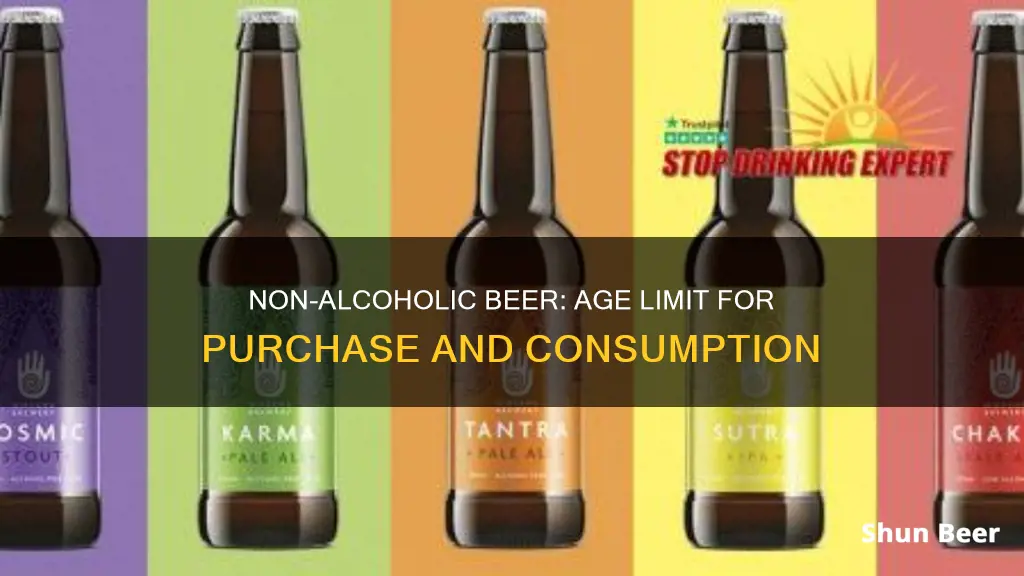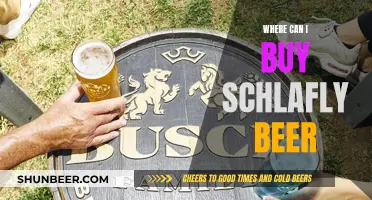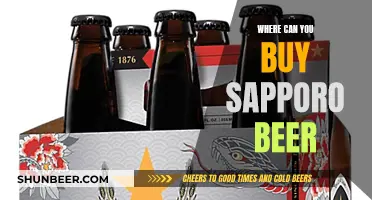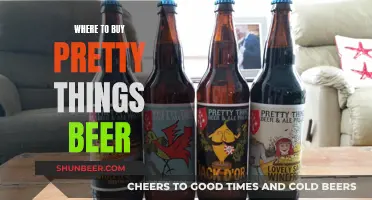
The legal age for purchasing non-alcoholic beer varies depending on your jurisdiction. In the United States, the minimum legal drinking age has been 21 since 1984, and this is why restaurants, bars, and stores won't sell alcohol to anyone under 21. However, non-alcoholic beer is not 100% alcohol-free and typically has an ABV of up to 0.5%, so some states treat it differently. While some states allow minors to purchase non-alcoholic beers, others do not. For example, Georgia, New York, Tennessee, and Idaho ban the purchase and consumption of non-alcoholic beer by individuals under 21, whereas Ohio permits it for those over 18.
| Characteristics | Values |
|---|---|
| Minimum age to buy non-alcoholic beer in the US | Varies by state |
| Minimum age to buy non-alcoholic beer in Georgia, New York, Tennessee, and Idaho | 21 |
| Minimum age to buy non-alcoholic beer in Ohio | 18 |
| Minimum age to buy non-alcoholic beer in Oregon, West Virginia, and Wyoming | Cannot buy if under 21 |
| Minimum age to buy non-alcoholic beer in Alabama | Not regulated in wet counties; prohibited in dry counties |
What You'll Learn
- In the US, federal law prohibits the sale of alcoholic beverages to anyone under 21
- However, the law doesn't specify a minimum age for non-alcoholic beer
- State laws vary, with some allowing minors to buy non-alcoholic beer, and others prohibiting it
- Some retailers will refuse to sell non-alcoholic beer to minors to avoid accidentally selling alcoholic beer
- In some states, minors can drink non-alcoholic beer with parental permission

In the US, federal law prohibits the sale of alcoholic beverages to anyone under 21
The federal government can withhold up to 10% of federal funding for highways from states that do not prohibit people under 21 from buying or publicly possessing any alcoholic beverage. This has been an effective incentive for states to comply with the minimum drinking age, and, as of 1988, all 50 states and the District of Columbia had a minimum purchase age of 21.
While the purchase of non-alcoholic beer by those under 21 is illegal in most states, consumption is not. This is because individuals under 21 can drink alcoholic beverages under their parents' supervision. Additionally, in some states, minors are able to consume alcohol given some conditions, such as whether they are doing so under the supervision of a guardian or spouse who is over the age of 21.
The laws surrounding the purchase of non-alcoholic beer by those under 21 are complex and vary from state to state. For example, in Ohio, individuals must be over 18 to purchase non-alcoholic beer, while in Oregon, West Virginia, and Wyoming, individuals under 21 cannot purchase non-alcoholic beer with an ABV of 0.5% and above.
It is important to note that the laws and retailer policies surrounding the sale of non-alcoholic beer to minors vary significantly across the US, and it is essential to know the local regulations and policies before attempting to purchase.
Montana Beer Laws: When Can You Buy Alcohol?
You may want to see also

However, the law doesn't specify a minimum age for non-alcoholic beer
The laws surrounding the purchase of non-alcoholic beer vary across different states in the US. While the national minimum drinking age is 21, there are some states that allow minors to buy non-alcoholic beer. However, the law doesn't specify a minimum age for non-alcoholic beer; instead, this is left to individual states to decide. This has created a situation where the minimum age for buying non-alcoholic beer differs from state to state, and even then, the laws can be murky and undefined.
In some states, such as Georgia, New York, Tennessee, and Idaho, the purchase and consumption of non-alcoholic beer by individuals under 21 are strictly banned. These states have a broader definition of beer, classifying it as a "malt beverage", which includes any drink created through the fermentation of hops, barley, malt, and other similar grains. This means that non-alcoholic beer, despite having an alcohol content of less than 0.5%, is still considered a "beer" and is subject to the same restrictions as alcoholic beer.
On the other hand, there are states like Ohio, where minors over the age of 18 are allowed to purchase non-alcoholic beer. Additionally, in some states, while the purchase of non-alcoholic beer by minors may be illegal, consumption is not. This means that minors can drink non-alcoholic beer as long as it is purchased and provided by their parent or legal guardian. States with this exception include Alabama, Louisiana, Mississippi, New Mexico, North Carolina, North Dakota, Ohio, Oklahoma, Oregon, West Virginia, and Wyoming.
The lack of a clear federal guideline on the minimum age for non-alcoholic beer has led to a complex and inconsistent legal landscape. This is further complicated by store policies, which may prohibit the sale of non-alcoholic beverages to minors to avoid encouraging underage drinking or to minimise the risk of accidentally selling alcoholic drinks to customers under 21. As a result, individuals under 21 may find it challenging to purchase non-alcoholic beer in some states, even if it is not explicitly prohibited by law.
The Best Places to Buy Ultra-Right Beer
You may want to see also

State laws vary, with some allowing minors to buy non-alcoholic beer, and others prohibiting it
The laws surrounding the purchase of non-alcoholic beer vary across different US states. While federal law prohibits the sale of alcoholic beverages to anyone under the age of 21, it does not specify a minimum age for non-alcoholic beverages. This has resulted in a varied legal landscape at the state level, with some states allowing minors to buy non-alcoholic beer, and others prohibiting it.
In states like Ohio, minors over the age of 18 are permitted to purchase non-alcoholic beer. Additionally, in certain states, minors are allowed to consume non-alcoholic beer with parental permission or in the presence of a parent or guardian. These states include Alabama, Louisiana, Mississippi, New Mexico, North Carolina, North Dakota, Ohio, Oklahoma, Oregon, West Virginia, and Wyoming.
On the other hand, some states have stricter regulations, prohibiting the sale and consumption of non-alcoholic beer to individuals under 21. Examples of such states include Oregon, West Virginia, and Wyoming, New York, Tennessee, and Idaho. These states often have broader definitions of "beer", classifying it as any malt beverage with an alcohol content of 0.5% ABV or higher.
The legal landscape regarding non-alcoholic beer is further complicated by store policies. Many retailers, including liquor stores and franchise businesses, have policies prohibiting the sale of non-alcoholic beer to minors to avoid the risk of accidentally selling alcoholic beverages to underage customers and to discourage underage drinking.
The varying state laws and retailer policies highlight the importance of understanding the legalities surrounding non-alcoholic beer in one's specific state. While non-alcoholic beer may be a safer alternative to conventional beer, it is crucial to abide by local regulations and retailer policies to avoid any legal repercussions.
Tennessee's Early Beer Buying: Legal Hours and ID Requirements
You may want to see also

Some retailers will refuse to sell non-alcoholic beer to minors to avoid accidentally selling alcoholic beer
The laws surrounding the sale of non-alcoholic beer to minors vary across different regions. In the United States, the National Minimum Drinking Age Act of 1984 prohibits the sale of beverages containing alcohol to individuals under 21 years of age. However, since the passing of this Act, individual states have created their own laws regarding the purchase of non-alcoholic drinks, with some states allowing minors to buy and consume these beverages.
Despite the legal drinking age, some retailers will refuse to sell non-alcoholic beer to minors. This is primarily done to avoid accidentally selling alcoholic beer to underage individuals. The packaging and appearance of non-alcoholic beer are often indistinguishable from regular beer, making it challenging for staff to differentiate between the two, especially after the product has been served. By implementing a blanket restriction on all beer sales to minors, retailers can reduce the risk of accidentally selling alcoholic beverages to those under the legal drinking age.
In the United Kingdom, for example, the Licensing Act of 2003 states that "alcohol" refers to beverages with an alcohol by volume (ABV) of over 0.5%. Therefore, non-alcoholic drinks with an ABV of 0.5% or lower are not legally considered alcohol, and there are no specific age restrictions on their purchase. However, many retailers in the UK, including Tesco, Waitrose, and Co-op, choose not to sell these products to minors. They argue that selling non-alcoholic drinks that resemble alcoholic beverages could indirectly promote alcohol consumption to underage individuals. Additionally, it would be challenging for staff to distinguish between alcoholic and non-alcoholic drinks once they are poured into glasses, making it easier for minors to obtain alcoholic drinks without detection.
Retailers' decisions to restrict the sale of non-alcoholic beer to minors are driven by a desire to uphold their responsibility to protect children from the potential dangers of alcohol. While the law may permit the sale of these beverages to minors in certain regions, retailers often take a more cautious approach to avoid any potential legal repercussions and to maintain their reputation as responsible businesses that prioritize the well-being of their customers.
Buying Beer on Sundays in Ohio: What's the Deal?
You may want to see also

In some states, minors can drink non-alcoholic beer with parental permission
The laws surrounding the purchase of non-alcoholic beer by minors in the United States are complex and vary from state to state. While the National Minimum Drinking Age Act of 1984 prohibits the sale of beverages containing alcohol to those under 21, this does not include non-alcoholic beverages, which are legally defined as containing less than 0.5% ABV.
In some states, such as Alabama, Louisiana, Mississippi, New Mexico, North Carolina, North Dakota, Ohio, Oklahoma, Oregon, West Virginia, and Wyoming, minors are allowed to consume non-alcoholic beer with parental permission and/or in the presence of a parent or legal guardian. In these states, minors may also be able to purchase non-alcoholic beer, although this is not always the case, as some retailers will still require customers to be at least 21 years old to avoid legal loopholes.
In other states, such as Oregon, West Virginia, and Wyoming, minors are prohibited from purchasing non-alcoholic beer if it contains 0.5% ABV or higher. Additionally, some states, like Kansas, prohibit the consumption of any "cereal malt beverage" that has undergone fermentation, which could include non-alcoholic beer.
It's important to note that the laws regarding the purchase and consumption of non-alcoholic beer by minors can vary significantly from state to state, and even from county to county or city to city. As such, it's essential to check local regulations and retailer policies before attempting to purchase or consume non-alcoholic beer as a minor.
Buying Beer on Easter Sunday in Tennessee: What's Allowed?
You may want to see also
Frequently asked questions
No, but it depends on the state. While the federal government sets the drinking age at 21, states can choose to allow minors to buy non-alcoholic beer. For example, in Ohio, you can buy non-alcoholic beer if you're over 18.
No, non-alcoholic beer typically contains up to 0.5% alcohol by volume (ABV). However, some beers, like Budweiser Zero, contain 0.0% ABV.
In most states, yes. However, you will likely need your parents' permission and they will have to be with you when you are drinking.
It's best to avoid it. While non-alcoholic beer has a negligible amount of alcohol, authorities in most states view it the same as alcoholic beer.
No, you can't drink non-alcoholic beer at a club, pub, or bar if you are under 18, even if your parents are with you. You will need to be at your residence or on private property.







